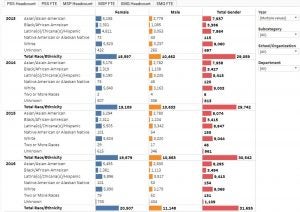Fellow Bruins,
@ the rally
Many of you have heard about last week’s “Kanye Western” party hosted by Sigma Epsilon Phi and Alpha Phi. Many of you have also heard my impromptu comments at the #BlackBruinsMatter rally. Waiting for the mic, outside of Kerckhoff Hall, I witnessed firsthand the pain and anguish on the faces of our African American students. A deep wave of sorrow flowed through me. I kept thinking to myself, “Why? In the 2nd week of school. After this horrific summer. Why did this have to happen?”
Groundhog day
But in truth, I wasn’t surprised. Like a bad looping video, each year, students on campuses across the country engage in some party, festivity, or joke that crosses the line into minstrelsy and exaggerated racial stereotypes. Remember the invitation to wear gold teeth and eat watermelon at the “Compton Cookout” at UCSD? How about the “lovely” sounds of ching-chong in “Asians in the Library” at UCLA? Or countless other examples that turn up on any Internet search. (See, e.g., “Rock Stars and Rappers”).
What’s tiresome is that these incidents follow the same worn script. Some students decide to celebrate, using caricatures. Students of color are stunned and protest. Universities respond (or don’t). The accused deny the accusation or express puzzlement why anyone has taken offense. Next they show remorse (or don’t). Pundits push back, complaining about over-sensitivity, political correctness gone wild, and the First Amendment. Anonymous hate mail, tweets, comments, and even death threats explode on all sides. Eventually, some resolution — often unsatisfying — is cobbled together. Things recede slowly to “normal.” Until next party season, at the next university. Rinse and repeat.
In my head, I already knew the script, but at the rally, I was still moved in my heart. Why? Because I saw up close the pain—caused by a lifetime of disrespect and disregard—on the faces of students that belong to our Bruin family, a family to which I have some responsibility. As the Vice Chancellor for Equity, Diversity and Inclusion, I vowed that I would fight to make sure that no one felt isolated, excluded, a second-class citizen while they were a Bruin. I took this job because I believed I could make some difference. But standing before that crowd, at that rally, just a few months into my tenure, I wasn’t sure that I could.
CrossCheck
I’m still not sure. But I said I would try. So here’s another one of my attempts to try something new and disrupt business as usual. How do we flip the script? How do we learn something new? Not something vague, trite, or banal, but something deeper about the structures that cause us to “rinse and repeat” this dysfunctional dance? In the hit movie “The Martian,” Matt Damon’s character, stranded on Mars, says “I’m going to have to science the s*** out of this.” A friend of mine, who is a Dean, said that the line reminded her of me. (This line also received some Twitter love from Astrophysicist Neil deGrasse Tyson.) I love that line, but it’s unduly narrow in this context. Science isn’t the only thing that’s relevant here. Also, we’re all in this together. So with a friendly amendment, I say to myself “We’regoing to have to think the s*** out of this.” Thinking starts now, and it’ll be featured on this section called CrossCheck.
First up: blackface
What is “blackface” anyway? Trust me, it’s not defined in some UCLA policy. There is no True Bruin principle that explicitly commits us not to dress up in blackface or yellowface or redface. So what is it? How do we know when it happens? And why does it upset people so? Lots of folks are genuinely confused. For example, at the party, when we see a picture of students with smudges on their faces, maybe we should be saying that they’re just gold miners, a play on Kanye’s “Gold Digger” (if you know Kanye, you understand my popular culture reference). And nothing more. And dressing up “gangsta” could be seen as just a harmless embrace of a globalizing hip-hop culture.
Thankfully I know someone who is an expert on blackface—Professor Eric Avila (History, Chicano Studies, and Urban Planning). He’s an Equity Advisor, which the Chancellor and the Executive Vice Chancellor instructed each school and division to appoint. Prof. Avila points out blackface as “one of the most cherished traditions in the history of white America.” I ask you to read his thoughtful commentary, which succinctly explains the roughly 200-year practice of blackface minstrelsy. It might help you understand why it isn’t that funny, regardless of intention.
But we were mocking Kanye/Kim/Kimye not all Black people
I get it. Those who hosted the party might have been mocking particular celebrities, who may be ripe for cultural critique. But isn’t it a slippery slope from mocking a particular icon to greenlighting the caricature of an entire people? As I explained in my “Which Way LA” interview, imagine there was a party mocking the hit song “Gangnam Style” (over 2 billion views on YouTube) by the Korean rapper Psy. A bunch of fraternity and sorority members riding imaginary horses on the dancefloor might seem awkward but not especially offensive. But after the keg starts flowing, what if folks also start making ching-chong sounds and flashing fake Tae Kwon Do moves. Or making slant-eyes a la Miley Cyrus for Instagrams and Snapchats? Still funny? If not, why not? Maybe my example differs from the Kanye Western party, but in what precise ways?
What if the “Compton Cookout” — purportedly held to “mock Black History Month” — happened right after the release of the movie “Straight Outta Compton.” Would the Cookout parody suddenly become an acceptable cultural performance because the hosts could point to a specific movie circulating in the theaters? Could some group hostile to Israel — or just interested in current events — call for a “Benjamin Netanyahu” party that would predictably invite every anti-Semitic character to be trotted out? And defend against the criticism by saying we were just mocking a public figure? Should it really be that easy?
But that wasn’t our intent
Again, I get it. There was no intent to be sadistic, harmful, to trigger protest rallies’ worth of pain. But in terms of morality, legality, and good judgment, intent is not the only thing that matters. We should always consider in addition both the impact and the social meaning of any action. Regardless of what you might think, it is a brute fact that a huge number of fellow Bruins felt deeply disrespected instead of being made to feel at home — during Black Bruin Welcome Week. And in the age of social media, where pictures get recirculated and tagged without context, no one should be so naive as to think that he or she fully controls the social meaning of any practice or action. It changes in context, over time, abruptly. And the social meaning of this party is being contested right now, even in this essay.
#BlackBruinsMatter
We need to disrupt business as usual. At a world-class public research university such as UCLA, that means thinking the s*** out of our challenges—checking, critiquing, deepening, pressing, learning, and understanding hard topics such as race and gender. I’m not exactly sure how to do this, but I am committed to try. These attempts will appear here on CrossCheck. Over the coming weeks and months, we will continue to add content explaining concepts and issues connected to this Office’s mission, which is to “Build equity, for all.”
We have the privilege of being Bruins. We must rise to the intellectual, emotional, and ethical challenge of breaking the infinite loop. Let’s make it matter.






